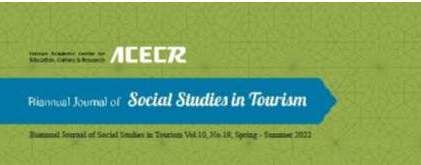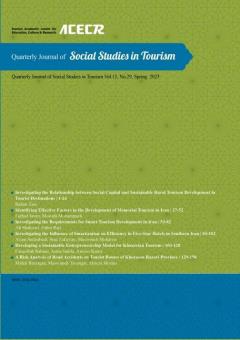Investigating the Influence of Smartization on Efficiency in Five-Star Hotels in Southern Iran
Subject Areas :
AZAM SAFARABADI
1
*
![]() ,
SINA ZAFARIAN
2
,
masoomeh moharrer
3
,
SINA ZAFARIAN
2
,
masoomeh moharrer
3
1 - Assistant Professor of Tourism and Hospitality Management Department, Shiraz University, Shiraz, Iran
2 - MA. student in tourism management, majoring in marketing, Shiraz University, Shiraz, Iran
3 - Department of Tourism and Hospitality Management, Shiraz University, Shiraz, Iran
Keywords: Hotel operational processes, Smart hotel, Automation, Thematic analysis, SECA,
Abstract :
As a transformative paradigm within the hospitality industry, smartization leverages technologies such as artificial intelligence, the Internet of Things, robotics, and automated systems to transform both operational processes and the guest experience, leading to enhanced efficiency, cost reduction, improved security, and the provision of personalized services. Therefore, this study sought to investigate the influence of smartization on the work processes of hotels, employing a mixed-methods (qualitative-quantitative) research design with an exploratory approach. In the qualitative phase, thematic analysis and library research were utilized to identify smartization indicators across three domains: operational (Reception, Accommodation, Food and Beverage, Housekeeping, etc.), support (Human Resource Management, Finance, Infrastructure Maintenance, Sales, and Procurement), and managerial (Planning, Organizing, Leading, and controlling). The quantitative phase employed the SECA (Simple Efficient Criteria Assessment) multi-criteria decision-making method and a multi-objective nonlinear programming model to evaluate the identified criteria. The target population comprised managers of five-star hotels in Southern Iran, from which 25 participants were selected using purposive and snowball sampling methods. The findings of the study revealed that smartization enhanced the guest experience through service personalization, improved efficiency, and cost reduction, consequently leading to increased satisfaction, loyalty, and profitability. Moreover, operational processes have been optimized through the implementation of smart hospitality systems. Additionally, support processes have been improved, contributing to cost efficiencies and enhanced guest satisfaction. On the other hand, managerial processes have been effectively directed and coordinated through the adoption of smart technologies. The quantitative analysis indicated that smartization exerted the most and least significant influence on managerial and operational processes within hotels, respectively. Therefore, it can be argued that the integration of innovative technologies enables hotels to augment productivity and profitability.
بلوچ، محمود.، و برفروشان، شازيه. (1397). بررسی کارکردهای هوشمندسازی مقاصد گردشگری در توسعه گردشگری الکترونیکی. چهارمین کنفرانس ملی پژوهشهای کاربردی در علوم مدیریت، اقتصاد و حسابداری ایران، https://civilica.com/doc/849453
دشت لعلی، زهرا.، علیقلی، ممصوره.، و نوربخش، سيدكامران. (1399). شناسایی و اولویت¬بندی عوامل موثر بر گردشگری هوشمند در کشور ایران (مورد مطالعه: شهر اصفهان)، مجله مدیریت کسب¬وکار، 48 (1399)، 196-212. https://sanad.iau.ir/Journal/bmj/Article/1068561/FullText
ظفریان، سينا. صفرآبادی، اعظم. (2023) بهرهگیری از سیستمهای اطلاعاتی در مدیریت هتلداری، کنفرانس بینالمللی چالشها و راهکارهای مدیریت توسعه با تاکید بر استان اردبیل. . https://isnac.ir/XGBF-KDHAG
Ashfaq, M., Ul Haq, I., Pham, H. C., Ullah Jan, I., & Shahzad, K. (2025). Critical determinants of intentions to revisit smart hotels: an examination of smart service interactional experience, emotions, and technophilia. Journal of Hospitality Marketing & Management, 1-24. https://doi.org/10.1080/19368623.2025.2464029
Burton, M. R., Obel, B., & DeSanctis, G. (2011). Organizational design: A step by step approach, cambridge. Seciond edition.
Çeltek, E. (2024), "Unmanned smart hotel: applications and examples", Worldwide Hospitality and Tourism Themes, Vol. 16 No. 5, pp. 611-626. https://doi.org/10.1108/WHATT-06-2024-0137
Chang, Y. S., Cheah, J. H., Lim, X. J., Morrison, A. M., & Kennell, J. S. (2022). Are unmanned smart hotels du jour or are they here forever? Experiential pathway analysis of antecedents of satisfaction and loyalty. International Journal of Hospitality Management, 104, 103249.https://doi.org/10.1016/j.ijhm.2022.103249
Chung, K. C., & Tan, P. J. B. (2025). Artificial intelligence and internet of things to improve smart hospitality services. Internet of Things, 101544. https://doi.org/10.1016/j.iot.2025.101544
Diwan, S. A. (2025). Optimizing guest experience in smart hospitality: Integrated fuzzy-AHP and machine learning for centralized hotel operations with IoT. Alexandria Engineering Journal, 116, 535-547. https://doi.org/10.1016/j.aej.2024.11.051
Djauhari, T., & Rahmawati, N. (2025). Smart Hotel Security: Integrating AI for Advanced Safety Solutions. IOTA Journal, 5(1), 14-26. https://doi.org/10.31763/iota.v5i1.787
Fang, C.C. and Liou, J. (2024), "Developing an assessment framework of smartized upscale hotel workforce employability from the practitioners' perspective", Journal of Hospitality and Tourism Insights, Vol. 7 No. 3, pp. 1636-1659. https://doi.org/10.1108/JHTI-05-2023-0315
Gretzel, U., Sigala, M., Xiang, Z., & Koo, C. (2015). Smart tourism: foundations and developments. Electronic markets, 25, 179-188. https://doi.org/10.1007/s12525-015-0196-8
Keshavarz-Ghorabaee, M., Amiri, M., Zavadskas, E. K., Turskis, Z., & Antucheviciene, J. (2018). Simultaneous evaluation of criteria and alternatives (SECA) for multi-criteria decision-making. Informatica, 29(2), 265-280. https://content.iospress.com/articles/informatica/inf1182
Kim, J. J., & Han, H. (2020). Hotel of the future: exploring the attributes of a smart hotel adopting a mixed-methods approach. Journal of Travel & Tourism Marketing, 37(7), 804-822. https://doi.org/10.1080/10548408.2020.1835788
Krstić, B., Kahrović, E., & Stanišić, T. (2015). Business Process Management in Hotel Industry: a Proposed Framework for Operating Processes. Ekonomika, 61(4), 21-34. 10.22004/ag.econ.240764
Özdemir, A. İ., Çolak, A., & Shmilli, J. (2019). Business Process Management in Hotels: with a Focus on Delivering Quality Guest Service. Quality & Quantity, 53(5), 2305-2322. https://doi.org/10.1007/s11135-018-0727-4
Pertusa-Ortega, E. M., Tarí, J. J., Molina-Azorín, J. F., & Pereira-Moliner, J. (2025). Agility as a mediator in the relationship between quality management and hotel performance. Service Business, 19(1), 1-30. https://doi.org/10.1016/j.ijhm.2024.103965
Stylos, N., Fotiadis, A. K., Shin, D. D., & Huan, T.-C. T. (2021). Beyond Smart Systems Adoption: Enabling Diffusion and Assimilation of Smartness in Hospitality. International Journal of Hospitality Management, 98, 103042. https://doi.org/10.1016/j.ijhm.2021.103042
Yadav & Raju (2025). Smart Hotel Technologies Redefining Guest Convenience and Operational Efficiency. In Marketing Technology-Infused Hospitality: Upskilling Frontline Employees for Competitiveness (pp. 25-56). IGI Global Scientific Publishing. DOI: 10.4018/979-8-3693-7127-5.ch002
Yağmur, Y., Demirel, A. and Kılıç, G.D. (2024), "Top quality hotel managers' perspectives on smart technologies: an exploratory study", Journal of Hospitality and Tourism Insights, Vol. 7 No. 3, pp. 1501-1531. https://doi.org/10.1108/JHTI-09-2022-0457
Ye, B. H., Ye, H., & Law, R. (2020). Systematic review of smart tourism research. Sustainability, 12, 3401. https://doi.org/10.3390/su12083401

